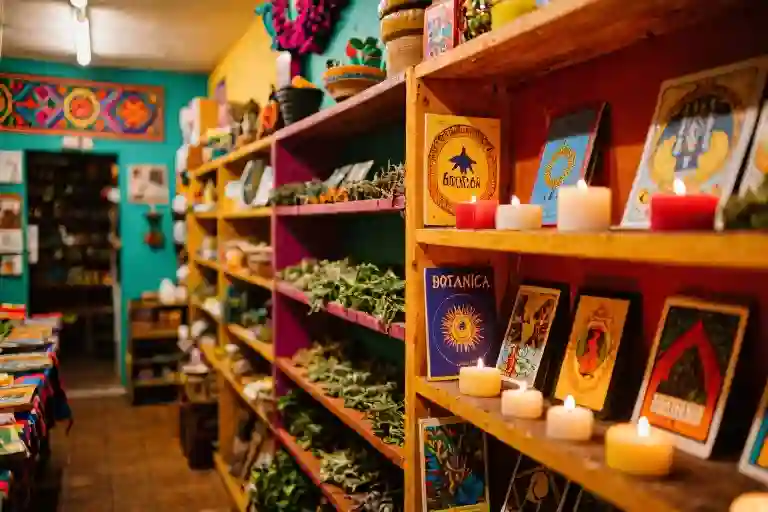The raid happened on a Tuesday morning, when the neon palm sign in Mrs. Rodriguez’s botánica was still blinking from the night before. Detroit police officers confiscated tarot decks, bundles of sage, and handwritten prayer books—all under a local ordinance banning ‘fortune-telling for gain.’ As officers loaded boxes into their squad cars, neighborhood regulars stood frozen on the sidewalk, some still clutching the herbal teas they’d come to collect for arthritis and insomnia. Mrs. Rodriguez’s botánica wasn’t just a shop; it had been the only place many in this immigrant-heavy community could afford to seek comfort after factory layoffs.
This scene—repeated in various forms from New York to New Orleans—raises uncomfortable questions. Why are 21st-century law enforcement agencies still wielding legal codes that echo Rome’s Lex Cornelia from 81 BCE? How does a nation built on religious freedom justify prosecuting spiritual counselors under fraud statutes? The answers reveal an uncomfortable truth: what we dismiss as ‘fortune-telling’ is often frontline mental healthcare for marginalized communities, a fact COVID-19 made impossible to ignore.
At its core, the policing of practices like tarot reading or herbal medicine isn’t about protecting citizens from fraud. It’s about maintaining a hierarchy of care that privileges expensive, institutionalized therapy over accessible, culturally rooted alternatives. The very same Detroit neighborhood where Mrs. Rodriguez’s botánica was raided has zero practicing psychiatrists within a 5-mile radius. Meanwhile, her $20 sliding-scale consultations—combining card readings with active listening and community wisdom—had kept multiple locals from spiraling during unemployment crises.
Modern research is beginning to validate what these traditions have known for centuries. Studies on ritual psychology (MIT Press, 2020) show that structured symbolic practices—whether laying tarot cards or interpreting tea leaves—activate the same cognitive pathways as clinical therapeutic techniques. The difference? A therapy session might cost $120 with a 3-month waitlist, while a neighborhood reader provides immediate narrative framing for the price of a grocery run. This isn’t superstition versus science; it’s about who gets to define ‘legitimate’ care.
During pandemic lockdowns, this disparity became life-threatening. As hospitals overflowed and therapy moved online, those without reliable internet or insurance found themselves stranded. In response, traditional healers worldwide adapted with stunning agility: Brazilian búzios readers conducted shell divinations via WhatsApp voice notes, Filipino hilot masseuses guided stress-relief acupressure through grainy video calls, and Appalachian granny witches hosted group tarot sessions on Zoom. These weren’t just spiritual services—they were triage for the soul, filling gaps in systems that had failed the vulnerable.
The persistence of anti-fortune-telling laws exposes our cultural blind spots. We accept that art therapy uses colors and shapes to access emotions, yet scoff when a palm reader traces life lines to spark self-reflection. We praise mindfulness apps for incorporating Buddhist principles but deride community elders who blend herbalism with prayer. This hypocrisy costs lives: when Detroit shut down Mrs. Rodriguez’s botánica, three regulars later confided they’d turned to alcohol to cope with the loss of their primary emotional outlet.
What if we stopped seeing these traditions as threats to modern mental healthcare and started recognizing them as its most resilient allies? The solutions are within reach—repealing archaic ordinances, training bridge workers who can navigate both clinical and folk systems, protecting oral traditions before they’re lost. But first, we must confront our biases. That blinking neon palm wasn’t just a shop sign; it was a beacon for those the system had left in darkness.
From Ancient Rome to Detroit: A Legal History of Systemic Discrimination
The raid on Detroit’s botánicas in 2018 didn’t make national headlines, but it should have. When police confiscated tarot cards and arrested practitioners under an anti-fortune telling ordinance, they weren’t enforcing some forgotten relic – they were continuing a 2,000-year tradition of using laws to marginalize community healers. What began with Rome’s Lex Cornelia in 81 BCE continues today through municipal codes that disproportionately target immigrant and working-class practitioners.
The Legal Timeline of Oppression
| Era | Law/Ordinance | Targeted Group | Common Justification |
|---|---|---|---|
| 81 BCE | Lex Cornelia (Rome) | Independent diviners | “Preventing fraud” |
| 1542 | Witchcraft Act (England) | Folk healers | “Protecting religion” |
| 1911 | Gypsy Banishment Ordinance (NY) | Romani communities | “Public morals” |
| 2020s | Municipal fortune-telling bans (US) | Immigrant practitioners | “Consumer protection” |
The pattern emerges clearly: laws claiming to prevent fraud or protect public order consistently single out cultural practices associated with marginalized groups. Detroit’s case followed this blueprint perfectly – the raided botánicas served primarily Latinx communities, blending Catholic traditions with Afro-Caribbean spiritual practices that include divination.
Anatomy of a Modern Raid
During the Detroit enforcement actions:
- Undercover officers requested readings, then immediately revealed themselves as police
- Practitioners were charged despite no money changing hands
- Inventory including religious items was seized as “evidence”
- Store owners reported lasting trauma and business losses
What makes these cases particularly insidious is how vague legal language gets weaponized. Most ordinances prohibit “pretending to tell fortunes” or “claiming supernatural powers” – definitions broad enough to encompass everything from tarot readings to traditional healing ceremonies. As constitutional lawyer Marcia Jennings notes: “These laws don’t define fraud in any measurable way. They simply assume certain cultural practices must be deceptive by nature.”
The Fraud Fallacy
Modern legal challenges reveal the hypocrisy:
- In 2019, a New York court ruled astrology apps don’t violate fraud statutes because users understand they’re entertainment
- Yet the same year, a Romani palm reader faced charges under nearly identical laws
The difference? Context and culture. When middle-class consumers download Co-Star, it’s harmless fun. When immigrant grandmothers read coffee grounds, it’s suddenly criminal. This double standard persists because the laws were never really about fraud – they’re about maintaining hierarchies of whose knowledge gets respected.
The Human Cost
Behind every ordinance are real community consequences:
- Elder practitioners afraid to share generational knowledge
- Clients losing trusted mental health alternatives
- Cultural traditions driven underground
As botánica owner Elena Ruiz testified after the raids: “They called us frauds, but we’re the ones people come to when they can’t afford therapy. Now where will they go?”
This legal history matters because understanding the pattern helps break it. When we see Detroit’s ordinances not as isolated cases but as the latest chapter in an ancient playbook, we can start rewriting the script.
The Science Behind Tea Leaves: Psychological Evidence for Traditional Healing Practices
For centuries, the rhythmic shuffling of tarot cards or the patient interpretation of tea leaves have been dismissed as mere superstition. Yet modern research reveals what traditional communities have always known – these practices offer genuine psychological benefits that mainstream therapy often struggles to replicate. At their core, divination methods create structured rituals that provide comfort during life’s uncertainties, something neuroscience now helps us understand.
The Neurology of Ritual
MIT’s 2020 study on everyday rituals demonstrated how structured, repetitive actions activate the prefrontal cortex while reducing amygdala activity – essentially calming our fear response while engaging our problem-solving faculties. This explains why the deliberate process of a tarot reading (shuffling, selecting, interpreting cards) creates such profound mental clarity for seekers. The ritual isn’t magical thinking – it’s neurological self-regulation disguised as fortune-telling.
Consider the Mexican curanderos study that made waves in transcultural psychiatry circles. Researchers measured cortisol levels in clients before and after traditional healing sessions involving herbs, prayer, and divination. The results showed stress hormone reductions comparable to cognitive behavioral therapy sessions. When participants described feeling “lighter” after consultations, they weren’t just using metaphors – their biochemistry had literally shifted.
Cross-Cultural Case Studies
Vietnam’s Tea Leaf Readers
In Hanoi’s old quarter, thầy bói (fortune tellers) have served as unofficial therapists for generations. Their tea leaf readings follow a precise ritual: the client drinks slowly, leaves the final sip, then waits while patterns are interpreted. What Westerners might call “archetypal storytelling,” Vietnamese practitioners understand as “narrative reframing” – helping clients see life challenges through new symbolic frameworks. The ritual’s power lies in its pacing; the forced pause between drinking and interpretation creates space for personal insights to surface.
Romania’s Prayer Healers
Descântătoare (traditional healers) in rural Transylvania blend herbal remedies with divination and prayer. Their approach recognizes what modern psychology terms “the biopsychosocial model” – that physical health intertwines with mental and community wellbeing. When treating anxiety, a descântătoare might prescribe mint tea (calming the nervous system), a protective prayer (addressing spiritual concerns), and recommend visiting a specific elder (strengthening social bonds). This holistic approach often proves more culturally resonant than isolated talk therapy for local communities.
Appalachia’s Granny Witches
The hereditary tarot readers of Kentucky’s hills developed unique spreads for addressing practical mountain life concerns – relationship tensions, financial worries, or decisions about leaving the holler. Their readings incorporate folk wisdom about human nature passed through generations. Modern psychologists would recognize their methods as “solution-focused brief therapy” – using cards as visual prompts to help clients identify their own answers. The granny witches’ true magic wasn’t prediction, but helping people access inner wisdom they already possessed.
Why These Methods Endure
Traditional healing practices persist because they meet psychological needs that clinical settings often overlook:
- Ritual creates safety – The predictable steps of a reading (shuffling cards, brewing tea) establish comfort before exploring difficult topics
- Symbols bypass resistance – Clients who would balk at direct advice often accept the same insight when framed through tarot archetypes or astrological transits
- Community sustains healing – Unlike isolated therapy sessions, many traditional practices occur in social contexts, reinforcing that no one heals alone
- Accessibility matters – From sliding-scale fees to kitchen-table availability, these methods remove barriers that keep people from seeking help
Recent years have seen increasing collaboration between traditional healers and mental health professionals. In Oaxaca, curanderos now work alongside psychologists at community clinics. Some Boston hospitals employ “medical astrologers” to help patients understand treatment timelines. As research continues validating these ancient practices, perhaps we’re finally moving beyond false divisions between “science” and “folk wisdom” – recognizing that healing has always been both an art and a science.
Blossoms in the Cracks: Traditional Wisdom’s Pandemic Adaptation
When COVID-19 lockdowns severed physical connections, an unexpected revival occurred in the digital alleys of Brazil’s favelas. WhatsApp groups normally buzzing with family updates transformed into virtual healing circles, where neighborhood mães de santo offered free búzios readings through pixelated video calls. This wasn’t mere entertainment—it was crisis response. A 2021 BBC report revealed that searches for “WhatsApp fortune telling” tripled during Brazil’s second wave, with shell readers adapting centuries-old divination techniques to comfort isolated souls through smartphone screens.
The Filipino Prayer Network Phenomenon
Across the Pacific, Manila’s traditional hilot healers faced an impossible choice: abandon their community or reinvent centuries of hands-on practice. What emerged was orasyon online—prayer sessions conducted via Facebook Live, where healers guided viewers through ancestral invocations while simultaneously teaching breathing techniques. “We’d see the same faces every Thursday night,” recalls Lola Esmeralda, a 72-year-old prayer healer. “Nurses still in PPE uniforms, students afraid of failing online classes—they needed more than Zoom therapy.” Her makeshift studio—a repurposed sewing nook with a Santo Niño statue and ring light—became a testament to traditional healing’s viral adaptability.
Astrology Apps and Exhausted Caregivers
The pandemic’s psychological toll manifested unexpectedly in App Store metrics. Data from Sensor Tower showed astrology apps like Co-Star and The Pattern saw 150% growth among healthcare workers between 2020-2022. Dr. Alicia Mendez, an ICU nurse in Phoenix, describes her unlikely coping mechanism: “After three codes in one shift, I’d check my transit chart like others check the weather. Seeing Mercury retrograde didn’t cure my PTSD, but it helped frame the chaos as part of some larger rhythm.” This wasn’t about planetary influence—it was about pattern recognition, a way to impose narrative structure on unimaginable stress.
Appalachian Zoom Tarot: Grandmothers Meet Gen Z
In the hollows of West Virginia, hereditary readers preserved an oral tradition through unexpected means. Granny Mae’s weekly “kitchen table tarot” sessions—once limited to neighbors who could hike up her mountain—suddenly reached global audiences via Zoom. Her granddaughter taught her to use virtual backgrounds (“Ain’t no need them city folks seeing my peeling wallpaper”), while maintaining the ritual of brewing sassafras tea before each reading. What began as family necessity became cultural preservation; her recordings now serve as teaching tools in Appalachian studies programs.
The Paradox of Digital Ritual
These adaptations revealed a profound truth: even when stripped of physical trappings—the smoke of burning herbs, the weight of tarot cards—the core therapeutic elements remained intact. MIT’s 2020 ritual psychology research helps explain why. The predictable structure (drawing cards in sequence), sensory engagement (the sound of shuffling through phone speakers), and symbolic interpretation all survived digital translation. As one Rio de Janeiro client noted: “When Dona Maria shook those shells on camera, it still felt sacred. Maybe because we both knew she’d done it the same way for 40 years.”
Cultural First Responders
This global phenomenon exposed traditional healers as unofficial mental health first responders. Unlike overwhelmed hospital systems requiring referrals and copays, these practitioners operated on what anthropologists call “crisis time”—immediate, flexible, and culturally fluent. A Detroit-based study found that during peak COVID months, community botánicas provided more mental health consultations than all neighborhood clinics combined, despite operating under legal threats. Their secret? As owner Yadira Alvarez puts it: “We speak in stories, not DSM codes.”
Preservation Through Innovation
The pandemic unexpectedly became the greatest documentation project in folk healing history. Filipino babaylans recording prayer chants for YouTube, Romanian drabarni creating TikTok herb tutorials, Appalachian grannies archiving moon phase remedies on Google Drive—all while maintaining the living essence of their traditions. This digital renaissance suggests an optimistic future: one where traditional wisdom doesn’t just survive, but evolves without losing its soul.
The Takeaway: Adaptive Roots
What COVID-19 taught us transcends public health. It revealed traditional healing’s radical adaptability—not as a lesser substitute for clinical care, but as a parallel system with unique strengths. When institutions faltered, these practices bent like bamboo: WhatsApp shells replacing market stalls, prayer chains migrating online, grandmothers becoming tech-savvy oral historians. Their persistence offers a blueprint for mental healthcare that’s resilient, culturally rooted, and unshackled from bureaucratic constraints. Perhaps healing was never meant to happen only in sterile offices—sometimes it blossoms brightest in the cracks.
Building an Inclusive Healing Ecosystem Without Medicalization
The path forward isn’t about forcing traditional healing practices into sterile clinical boxes or slapping medical terminology onto centuries-old wisdom. True progress lies in creating ecosystems where diverse healing modalities coexist, complementing rather than competing with each other. This requires systemic changes—from legal reforms to grassroots knowledge preservation—that honor these traditions on their own terms.
Repealing Archaic Laws: Recent Victories and Ongoing Battles
Several U.S. states have recently demonstrated how outdated anti-fortune telling ordinances can be challenged successfully. In 2022, New Mexico became the first state to explicitly exempt traditional healing practices from its consumer fraud statutes through Senate Bill 12. The legislation received bipartisan support after testimonials from curandera practitioners about how these laws disproportionately targeted Latino communities.
Key strategies from successful repeal efforts:
- Historical Context Presentations: Showing legislators century-old meeting minutes where similar laws were used to target Romani and Indigenous communities
- Economic Impact Reports: Demonstrating how botánica shops contribute to local economies (the Detroit raid alone caused $250,000 in lost community revenue)
- Testimonials with Metrics: Pairing practitioner stories with data like the Mexican cortisol studies to prove therapeutic value
Ongoing campaigns in states like Michigan and Louisiana are adapting these approaches while adding:
- Religious Freedom Arguments: Highlighting how many divination practices are protected spiritual exercises
- Comparative Law Analysis: Showing how other nations regulate (rather than ban) these practices without issues
The Bridge Worker Initiative: Blending Traditions Responsibly
Pioneered in California’s Central Valley, the Bridge Worker training program creates paraprofessionals fluent in both clinical psychology basics and traditional healing modalities. Participants—often bilingual community members—complete:
- 200 hours of certified mental health first aid training
- 150 hours apprenticing with local elders (curanderas, root workers, astrologers)
- Cultural competency modules on recognizing when clients need clinical intervention
Early results show Bridge Workers successfully:
- Increased mental health service utilization in migrant communities by 40%
- Reduced unnecessary emergency room visits for anxiety-related symptoms
- Created referral networks between clinical therapists and traditional practitioners
Maria Gutierrez, a Bridge Worker in Fresno, describes her role: “I’m not translating languages—I’m translating worldviews. When an abuelita tells me she’s suffering from mal de ojo, I can help her find both spiritual cleansing and a therapist who understands somatic symptom disorder.”
Preserving Living Traditions: Three Innovative Models
- The Appalachian Tarol Oral History Project
Documenting the “kitchen table wisdom” of mountain readers through:
- Video recordings of readings with contextual commentary
- Interactive maps showing how card interpretations vary by region
- Youth apprenticeship matching (14 teens currently learning from elders)
- Detroit’s Botánica Business Incubator
Helping spiritual shops diversify income streams through:
- E-commerce training for selling ritual items online
- Legal workshops on compliant service descriptions
- Cooperative buying networks for herbs and candles
- Mobile Divination Libraries
Rotating collections of:
- Culturally significant divination tools (from cowrie shells to runes)
- Multilingual interpretation guides
- Local practitioner directories
Currently piloted in three Texas border towns with plans for national expansion
Practical Steps for Allies
For readers inspired to support this movement:
- Research Local Laws: Search municipal codes for “fortune telling” or “occult” ordinances (present in 68% of U.S. cities)
- Support Ethical Practitioners: Look for community-rooted healers who:
- Offer sliding scale options
- Clearly state their practice’s nature (entertainment vs. spiritual guidance)
- Respect client autonomy
- Amplify Marginalized Voices: Share stories of traditional healers from their own perspectives rather than through sensationalized media
This isn’t about returning to some imagined pastoral past, but about recognizing that in our increasingly fragmented world, we need every available tool for healing—whether it comes wrapped in peer-reviewed studies or the shuffling of a well-worn tarot deck.
Beyond Marginalization: A Call to Honor Healing Diversity
Marginalization isn’t a passing trend—it’s the lived reality for traditional healers who’ve persisted through centuries of systemic discrimination. From the botánicas of Detroit to the digital tarot readers of Appalachia, these practitioners continue offering care despite legal harassment and cultural stigma. Their resilience mirrors the tenacious medicinal plants that grow through sidewalk cracks, thriving where they’re least expected but most needed.
Three Actions You Can Take Today
- Challenge Outdated Laws
Research your local ordinances using keywords likeanti-fortune telling ordinance repeal. Many communities have hidden statutes dating back to the 1920s moral panics. Share findings with civil liberties organizations—the ACLU has successfully overturned several such laws when brought to their attention. - Support Ethical Practitioners
Seek out traditional healers in your area or explore verified online communities (searchbest online communities for folk healing 2024). Prioritize those offering sliding-scale services or cultural preservation initiatives. A simple testimonial about how tea leaf reading helped your decision-making process does more than you might imagine to combat stigma. - Bridge the Knowledge Gap
Next time you hear someone dismiss astrology as “just superstition,” share the MIT Press research on ritual psychology or the Mexican curanderas cortisol study. Frame it as “different pathways to the same goal—emotional wellbeing” rather than an either/or debate between modern therapy and traditional practices.
A Vision for Integrated Healing
Imagine walking into a community health center where options include:
- A licensed therapist trained in trauma-focused CBT
- A Romani drabarni offering herbal consultations
- A VR station for guided ancestral meditation
- A bulletin board advertising both support groups and full moon divination circles
This isn’t fantasy—pilot programs in New Mexico and Oregon are already creating such spaces. When we stop forcing hierarchies upon healing modalities, we create ecosystems where clinical expertise and folk wisdom amplify each other. The COVID-19 pandemic proved these traditions aren’t relics—they’re renewable resources for collective resilience.
As you close this article, consider how you might nurture these “weeds of wisdom” in your own community. Sometimes the most profound growth happens at the edges.





